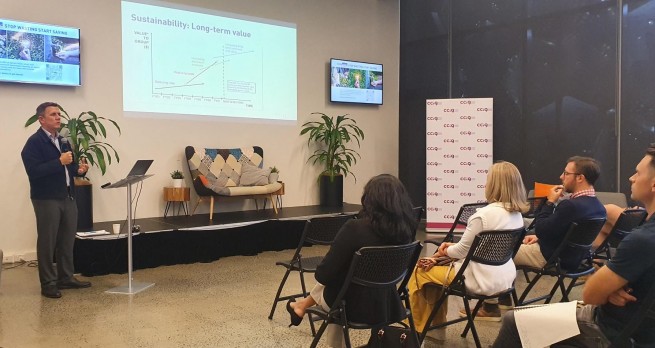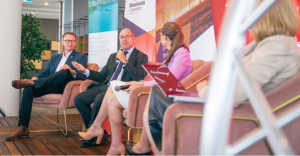Practical tips to get businesses started with sustainability
Published on 29 June 2022
Most businesses have been affected in the last few years by a range of natural disasters and the COVID-19 pandemic. It feels like there is a lot of change at the moment – economically, politically and in the environment.
Sustainable practices have become a priority for many businesses looking to reduce waste production, save on utility expenditure, and leverage a high-quality reputation.
Consumer sentiments are shifting:- A recent study found more than 67 per cent of Australian consumers are influenced by green or sustainability issues when making retail purchases.
CCIQ heard from Andrew Chamberlin, ecoBiz sustainability coach, at a recent CCIQ masterclass at the Brisbane Business Hub on building business resilience with sustainability. Andrew has 25 years of experience in delivering programs and projects in sustainability, planning, renewable energy, water, and urban regeneration.
Andrew talked about:
- Resilience
- What is changing – creating pressures and opportunities for business
- What Sustainability initiatives should businesses know about
- What industry sectors are doing – such as small business, tourism, agriculture
- How to plan for risks and opportunities
- What support, guidance and recognition is available
- What can you do now?
Get the highlights from his session below.
Why businesses need to develop resilience?
Resilience is the capacity of a system, enterprise or person, to maintain its core purpose and integrity in the face of dramatically changed circumstances.
Businesses have to keep in mind a few key questions to build their resilience:
- What has changed for your business?
- Have you adapted?
- How have you changed and what have you put in place?
- What are you plans for further improvements over the next 12 months?

What is changing?
The pandemic, increasing operational costs and climate risks such as flooding, are all examples of drastically changing business circumstances for many industries in Queensland. Those changes are predicted to increase in the future.
The climate is changing, and in South-east Queensland, we are likely to see increased temperatures with corresponding increases in extreme weather events over time.
There is a growing realisation that climate change is a significant and growing threat, and more and more businesses are making commitments to reduce emissions in line with the Paris Agreement. There are also additional expectations surrounding climate and carbon disclosure statements.
Global Megatrends
As well as change, there are other global trends at play: CSIRO has been researching the most likely case scenarios and mapping megatrends that will affect most businesses.
According to CSIRO’s megatrend analysis, the trends highlighted below will likely impact Australia over the coming 20 years.
- More from less: This megatrend is about efficiency. Businesses will need to be more efficient and learn how to generate more business with less access to resources in the future.
- Going, going, gone: This megatrend refers to biodiversity and how the ecosystem has evolved over time.
- Silk highway: This refers to the strongest financial connects with developing Asian countries into the Australian economy.
- Forever young: This megatrend is about focusing more on physical and mental health and increasing life expectancy.
- Virtually here: This megatrend talks about online collaboration and the growth of digital age.
- Great expectations: This megatrend illustrates the trend towards the desire for services and experiences over products. Customers will tend to look for an experience rather than a product.
Each of these mega-trends are worthy of consideration by business. They offer a guide to what may change over time, all requiring a form of planning. How will your business embrace the Virtually Here megatrend for example? Businesses with a plan will find themselves ahead of the curve with a higher level of resilience.
Sustainability
Andrew highlighted that while there are many recent challenges facing businesses with natural disasters, the pandemic and rising energy prices; there are a number of sustainability trends and initiatives that provide guidance.
There are many opportunities such as:
- Reducing Emissions through efficiency: taking simple steps to avoid emissions through energy and fuel efficiency.
- Renewable Energy: There are opportunities for businesses to save by switching to renewable energy, either via installation of solar panels or via renewable energy agreements with electricity retailers – look for Net Zero electricity.
- Circular economy principles: Changing our linear consumption model to one where we design products for durability, re-use and recyclability. Ensuring materials don’t make it into landfill and are cycled back into the production or distribution chain is a strategy businesses can start to undertake.
- Data and technology: There are many emerging technology and innovation trends, such as real-time monitoring, automation, micro-grids, electric and autonomous vehicles and artificial intelligence which all have roles to play in the unlocking of the sustainability potential of businesses.
- Global Goals: Working towards each of the United Nations’ 17 Sustainable Development Goals (SDGs) for a more sustainable future: identify which of the goals apply most to you and use the available tools and resources to develop a plan.
- Carbon offsets: As more companies look to become carbon neutral, demand for carbon offsets is growing. A once small market is now a $5 billion global market. $500 million is committed in land restoration funds for carbon markets in Queensland alone.
All of these underpin the megatrends impacting on small businesses. Consider each of these and how your businesses bottom line and reputation may benefit from them.
Taking the first step towards Net Zero
Net zero refers to the achieving a balance of zero emissions – where emissions are reduced, then unavoidable emissions are offset so that there are no net emissions.
Nationally and in Queensland, we have a target to achieve Net Zero by 2050 and 30% emissions reduction by 2030. Can you achieve the same for your business – or better? These targets may change as the public demands more decisive climate action.
While Net Zero might seem like an imposing task now, it can be broken down in simple steps starting with simple mitigation.
For example, ecoBiz helps businesses save on average 19% off their energy, water and waste costs.
There are several ways to begin your journey to Net Zero. Free and low cost steps you can take are:
- Understand your energy, water, and waste consumption. Check your bills and read meters. Get an idea of what is being consumed and when.
- Consider ways you can use less while producing the same – can you provide a good or service more efficiently. Look out for ways to make savings on your water and waste.
- Set an informed target based on what you can achieve.
- Can you offset any emissions by purchasing carbon offsets?
Think broader about wider benefits for you and your business.
What are current business responses to climate change?
The Queensland Government has developed Climate Adaptation Strategies for different sectors across the state, including the tourism, small business and agriculture sectors.
CCIQ led the development of the Climate Sector Adaptation Plan for Small and Medium Businesses. Working with businesses, they considered the physical risks from Climate Change, and external risks to businesses such as reputation, markets, policy and technology. Additional opportunities were also explored, such as resource efficiencies, energy security, new experiences and increased resilience. These considerations were all underpinned by Strategic Planning and Risk Management with the goal of attaining business stability and sustainability.
Businesses are likely to fall into three groups when responding to Climate Change impacts and pressure; deny, get by or prosper.
Deny and be reactive
Some businesses may find many reasons to avoid acting on climate change and postpone actions until absolutely necessary. A business might feel ‘’too busy’’ for example. When eventually forced to change by new regulations or repeated impacts, they might find it difficult to catch up. Reactive strategies offer no leeway and may expose businesses to many more risks.
Get by, or remaining in the status quo
For those that ‘get by’, they will modify as they go; with short-term planning and changes to meet the circumstances and the next targets. They will be adapting to change and becoming more efficient, responding to customer requirements and working with suppliers on challenges as they arise. These businesses may still continue to grow, but may not reach their full potential.
Plan ahead – the recommended course
Businesses who can plan, anticipate changes and transform will be able to prosper in an evolving world. These businesses will be thinking about what challenges and opportunities they will face and how to position to meet them. They will be thinking about who their customers are and what they expect, as well as how their suppliers will be changing. It may require a change to business model.
How to respond to climate change impacts and pressure?
Businesses should consider the risks of climate change on their industries and specific business. They are invited to think about the impact on their operations, and then find ways to reduce that impact. Importantly, consider opportunities as well.
Climate Risk Assessment Example
A Contract Cleaning Business based in Southeast Queensland who works throughout the state, identified the impact of increasing frequency of storms on their business. The storms can impact the business by damaging the customer premises and disrupting and delaying trips to the client’s premises. It can cause driver fatigue if drivers are needing to take detours or they are delayed.
The vulnerability for this business will be health and safety of staff on the road. There is the possibility of service disruption due to closed roads and infrastructure damage, as well as loss of work due to being cut off from the customer or jobs being cancelled. They will need to adapt: being flexible and have plans ready to implement in these circumstances to keep their clients serviced.
A potential opportunity for the business is the opportunity to provide increased rapid response clean-up after storms. They may offer a service that is able to mobilise quickly as they have planning in place to offer certainty to clients.
Find support to develop your sustainable plan
New initiatives offer the opportunity to reduce costs, unlock new markets and mitigate risks.
Andrew shared some amazing success stories of Queensland businesses and how they have saved on their energy, water, and waste costs.
These businesses in the past have struggled with lack of expertise and time to devote on adopting sustainable practices. Some of those businesses had operating restrictions such as leased premises and excessive staff, etc. Andrew mentioned how these struggling businesses were able to thrive and prosper with free support available from CCIQ’s ecoBiz expert sustainable coaches.
Read about such business success stories here.
Various programs can help you maximise your savings. Whether you are a small team, a large business or a sole trader, get in touch with experts to reduce your impact on the environment for a better tomorrow.
- ecoBiz: ecoBiz is a free program for small to medium businesses, not for profits, community associations and sporting clubs funded by the Department of Environment and Science Queensland. ecoBiz experts can help you develop an action plan to help your business save money and increase efficiency. Over 1000 businesses have trusted them already to receive free onsite coaching and start striving. Register today.
- Climate Active: Climate Active initiative supports and guides businesses in their carbon neutral journey. It is a collective vision of the Australian Government and Australian businesses to reduce our negative impact on the environment. Become carbon neutral and reduce the impact today.
- Certified B Corporation: A global organisation committed to transforming the global economy to benefit all communities and the planet. Achieve B Corp Certification by demonstrating a high environmental performance, making a legal commitment, and exhibiting transparency.
Sustainability ideas to immediately implement
Many sustainability steps can be taken at no or little cost, or with savings in mind.
- Lighting: Metal Halide high bay lamps can cost $400 per pair per year to run. At no cost you can switch off unused lighting. For a low cost you can clean skylights or install a switch to turn off unused warehouse areas. Or you can invest in energy efficient LED lighting for 50% savings.
- Hot water boiler: 20HP (10kW) boiler may be wasting $50/hr in gas. For no cost you can check for leaks. For a low cost you can check the steam traps and optimise the slope, diameter, insulation against wasted heat. Or you can invest in an upgraded boiler system.
- Start your Net Zero journey: find your most recent electricity and fuel bills and review them. Become familiar with any patterns of use. Start a simple spreadsheet or send them to the ecoBiz team to track your consumption. Look for efficiency opportunities.
For more advice specific to your business an ecoBiz consultant can audit your premise at no cost.
Top three takeaways
- Build resilience in your business by identifying the risks and the opportunities and thinking about their impact on your business.
- Create a simple plan to think about way to reduce the impact of these risks and get the most out of the opportunities.
- Develop goals and assess opportunities. Reach out for support to programs such as ecoBiz, Climate Active and Certified B Corporation for ideas and then recognition.
For more information about CCIQ’s free ecoBiz program contact us today.







